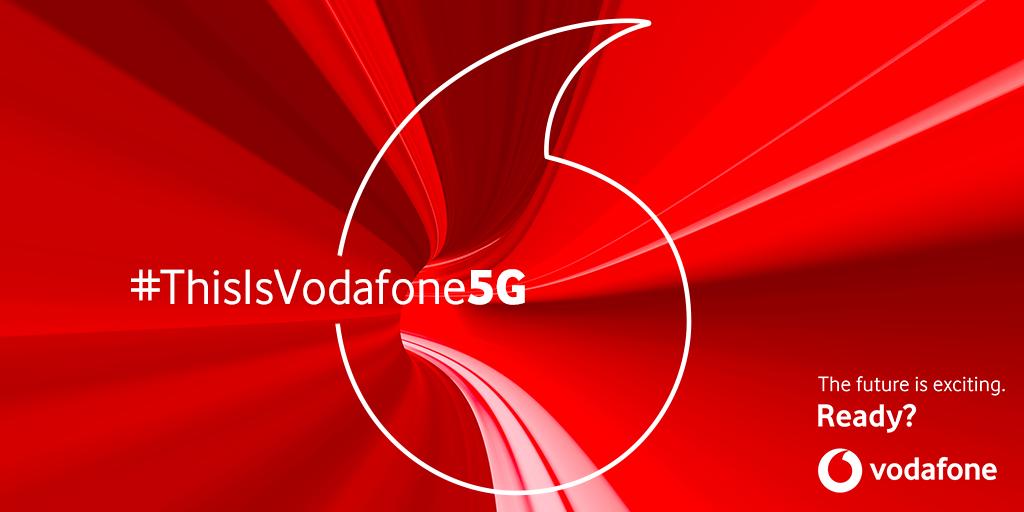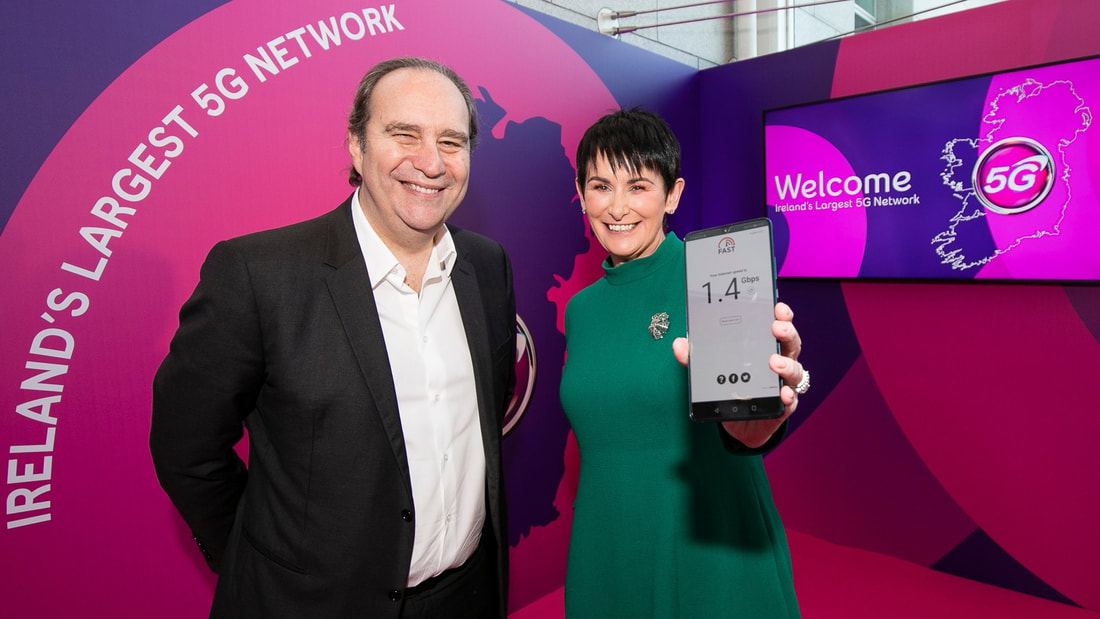Analysis: Vodafone goes unlimited in Ireland.
You either die a hero, or you live long enough to see yourself become the villain.
Published 18/05/2020
Unlimited. What was once a dirty word will now weave its way into the vernacular at Mountainview. Earlier this month, and amid the coronavirus pandemic, Vodafone debuted an array of entirely revamped price plans across its consumer and enterprise segments, each featuring an unlimited data allowance.
For many, including myself, the move is seen as somewhat of a watershed moment for the mobile market on this island. After years of reluctance, Big Red has conceded to the pressure of recent competitive developments and relinquished the usage-based monetisation strategy that has seen it dominate the market in terms of revenue.
It marks the death knell of the data allowance as we know it.
For many, including myself, the move is seen as somewhat of a watershed moment for the mobile market on this island. After years of reluctance, Big Red has conceded to the pressure of recent competitive developments and relinquished the usage-based monetisation strategy that has seen it dominate the market in terms of revenue.
It marks the death knell of the data allowance as we know it.
The State of the Irish Mobile Market.
There are a number of key metrics that influence the demand for a mobile operator’s service. Quality, which we will discuss later, is important. The same is true for brand recognition, customer service and simple word of mouth feedback from relatives and friends.
However, it is the price of the plan and the call, text and data allowance that is most of concern in the perception of relative value for money. This simple understanding formed the pretext for GoMo’s groundbreaking arrival last year, as eir sought to grow its subscriber base (and, eventually, revenue) with a cut-price plan free from limits.
At €0.125 per gigabyte (for 80GB), GoMo’s headline plan was hailed as the cheapest of its kind on the continent of Europe. The bold move was representative of a converged telecoms operator in a state of transformation, and it succeeded in sending a shiver down the spine of rival operators.
However, it is the price of the plan and the call, text and data allowance that is most of concern in the perception of relative value for money. This simple understanding formed the pretext for GoMo’s groundbreaking arrival last year, as eir sought to grow its subscriber base (and, eventually, revenue) with a cut-price plan free from limits.
At €0.125 per gigabyte (for 80GB), GoMo’s headline plan was hailed as the cheapest of its kind on the continent of Europe. The bold move was representative of a converged telecoms operator in a state of transformation, and it succeeded in sending a shiver down the spine of rival operators.
What has ensued since the inception of GoMo is a period of aggressive price-based competition, heralding a relapse in the slow but steady recovery of market revenues. There have been a series of price reductions and allowance enhancements trotted out by mobile operators and, in particular, MVNOs over recent months.
Up until three weeks ago, and despite some limited promotional offers, Vodafone’s reaction to these wider industry trends seemed negligible. The same was true last year. Some weeks prior to the arrival of GoMo but still in the presence of unlimited data offers from Three and eir, for example, Vodafone embarked on a glisty first-mover launch of 5G in Ireland.
While the 5G launch garnered the attention of the media with rather questionable promises of remote medical surgeries, it was more of the same from Vodafone on the pricing front. The operator sought to restrict 5G access to the bill pay segment, so as to drive adoption of plans with higher ARPU and improve customer retention, while maintaining small data allowances.
Notably, it was a far-cry from the 5G launch by Vodafone’s sister operator in the UK, which seized the opportunity to reinvent its price plans (which have only now been replicated here). Of course, market conditions in Ireland were and still are wildly different to those in the UK, where Vodafone wields a smaller share of the market relative to competitors O2 and EE.
In hindsight (which must be stressed), perhaps it was a strategic mistake for Vodafone to marry its 5G launch with the continuation of the usage-based monetisation strategy. This decision meant that the market was ripe for the arrival of GoMo, an arrival that subsequently dampened the focus on 5G (and network quality) and instead shifted it to price (at a time when CapEx requirements were ramping up).
Nonetheless, we can be sure that Vodafone has kept a very close eye on trends such as churn, with the goal of finding an equilibrium between ARPU (which would potentially suffer from a removal of data limits) and its subscriber base (which would decline in the absence of action). In any scenario, it is key to remember that the cost of customer acquisition markedly outweighs that of customer retention.
In the long run, however, it is almost inevitable that demand for any one operator's price reductions in the Irish market will be relatively inelastic.
Up until three weeks ago, and despite some limited promotional offers, Vodafone’s reaction to these wider industry trends seemed negligible. The same was true last year. Some weeks prior to the arrival of GoMo but still in the presence of unlimited data offers from Three and eir, for example, Vodafone embarked on a glisty first-mover launch of 5G in Ireland.
While the 5G launch garnered the attention of the media with rather questionable promises of remote medical surgeries, it was more of the same from Vodafone on the pricing front. The operator sought to restrict 5G access to the bill pay segment, so as to drive adoption of plans with higher ARPU and improve customer retention, while maintaining small data allowances.
Notably, it was a far-cry from the 5G launch by Vodafone’s sister operator in the UK, which seized the opportunity to reinvent its price plans (which have only now been replicated here). Of course, market conditions in Ireland were and still are wildly different to those in the UK, where Vodafone wields a smaller share of the market relative to competitors O2 and EE.
In hindsight (which must be stressed), perhaps it was a strategic mistake for Vodafone to marry its 5G launch with the continuation of the usage-based monetisation strategy. This decision meant that the market was ripe for the arrival of GoMo, an arrival that subsequently dampened the focus on 5G (and network quality) and instead shifted it to price (at a time when CapEx requirements were ramping up).
Nonetheless, we can be sure that Vodafone has kept a very close eye on trends such as churn, with the goal of finding an equilibrium between ARPU (which would potentially suffer from a removal of data limits) and its subscriber base (which would decline in the absence of action). In any scenario, it is key to remember that the cost of customer acquisition markedly outweighs that of customer retention.
In the long run, however, it is almost inevitable that demand for any one operator's price reductions in the Irish market will be relatively inelastic.
Differentiation through network quality.
It is common knowledge that network quality is a key pillar of differentiation for Vodafone in Ireland, and one that its marketing team has placed a large emphasis on. Indeed, the mobile operator has repeatedly highlighted its favourable ranking in performance data provided by third parties such as Umlaut (commissioned by Vodafone itself) and Ookla.
Such a lever as network quality is destined to be of significant benefit to the operator as data allowances, once a source of competitive differentiation for its rivals, effectively evaporates.
This is a particularly intriguing time in the network space as all of Ireland’s mobile operators engage in an overlay macrocell deployment of the 3.6 GHz band across large towns and cities. At the same time, Three (Ericsson) and eir (Huawei) are undergoing significant transformations of their respective Radio Access Networks (RANs), both aligning themselves with new vendors.
The above mentioned network rebuilds encompass a vast array of areas, each of which when combined is already delivering marked performance improvements. We should also remember that this upgrade work puts the two operators on a course to achieve network leadership in Ireland.
Such a lever as network quality is destined to be of significant benefit to the operator as data allowances, once a source of competitive differentiation for its rivals, effectively evaporates.
This is a particularly intriguing time in the network space as all of Ireland’s mobile operators engage in an overlay macrocell deployment of the 3.6 GHz band across large towns and cities. At the same time, Three (Ericsson) and eir (Huawei) are undergoing significant transformations of their respective Radio Access Networks (RANs), both aligning themselves with new vendors.
The above mentioned network rebuilds encompass a vast array of areas, each of which when combined is already delivering marked performance improvements. We should also remember that this upgrade work puts the two operators on a course to achieve network leadership in Ireland.
In eir’s case, there has been a focus on deploying additional multi-band macrosites to provide rural and urban in-fill coverage, as well enhancing capacity through carrier aggregation.
Eir has also alluded to the fact that its 5G network is the largest to date in terms of the number of active sites and coverage (>25% outdoor population coverage). On many of these sites, the operator is utilising 64T64R massive MIMO and providing more than 100MHz of capacity per sector by combining with the 4G anchor through EN-DC.
Three, meanwhile, is modernising its site portfolio by ripping out Samsung’s 4G LTE equipment (but, oddly, keeping Nokia on some sites for 900MHz) and installing Ericsson’s latest solutions. With the implementation of features such as 4T4R MIMO on refreshed sites, the mobile operator is unlocking substantial performance improvements on the best spectrum portfolio.
Vodafone, in contrast to its competitors, is not undergoing a network rebuild as it continues a relationship with Ericsson. While that doesn’t mean the operator is standing still (in fact, far from it), it does increase the likelihood that there will be more legacy equipment in its network over time, particularly across rural sites.
As of publication of this piece, it remains the only operator that has enabled VoLTE on its network (limited to select plans). This enables the use of Vodafone’s 4G spectrum portfolio for voice with an IMS architecture, as opposed to circuit switched fallback with 2G and 3G. The operator’s extensive low-band (800MHz) 4G LTE coverage has enabled this.
Looking ahead and in light of the move to unlimited data, Vodafone (as with all operators) will need to densify its site grid and leverage additional spectrum to satisfy the increasing demand for network resources. ComReg’s upcoming Multi-Band award will play a key role in facilitating the latter.
Eir has also alluded to the fact that its 5G network is the largest to date in terms of the number of active sites and coverage (>25% outdoor population coverage). On many of these sites, the operator is utilising 64T64R massive MIMO and providing more than 100MHz of capacity per sector by combining with the 4G anchor through EN-DC.
Three, meanwhile, is modernising its site portfolio by ripping out Samsung’s 4G LTE equipment (but, oddly, keeping Nokia on some sites for 900MHz) and installing Ericsson’s latest solutions. With the implementation of features such as 4T4R MIMO on refreshed sites, the mobile operator is unlocking substantial performance improvements on the best spectrum portfolio.
Vodafone, in contrast to its competitors, is not undergoing a network rebuild as it continues a relationship with Ericsson. While that doesn’t mean the operator is standing still (in fact, far from it), it does increase the likelihood that there will be more legacy equipment in its network over time, particularly across rural sites.
As of publication of this piece, it remains the only operator that has enabled VoLTE on its network (limited to select plans). This enables the use of Vodafone’s 4G spectrum portfolio for voice with an IMS architecture, as opposed to circuit switched fallback with 2G and 3G. The operator’s extensive low-band (800MHz) 4G LTE coverage has enabled this.
Looking ahead and in light of the move to unlimited data, Vodafone (as with all operators) will need to densify its site grid and leverage additional spectrum to satisfy the increasing demand for network resources. ComReg’s upcoming Multi-Band award will play a key role in facilitating the latter.
Tiered speeds enable performance-based monetisation.
As mentioned earlier, Vodafone’s foray into the unlimited space closely replicates that pursued by its sister operator in the UK last year. Instead of implementing a fair usage policy which covertly renders the plan a limited one after a specific amount of usage, the operator is instead managing network resources by tiering (or throttling) downlink traffic.
Of course, Vodafone has designed its unlimited portfolio in such a way that its more expensive bill pay plans provide access to greater download speeds. These high-end plans feature “fastest available speed”, while its pay as you go offering and low-end bill pay offerings feature “maximum download speed of 10Mbps”.
Of course, Vodafone has designed its unlimited portfolio in such a way that its more expensive bill pay plans provide access to greater download speeds. These high-end plans feature “fastest available speed”, while its pay as you go offering and low-end bill pay offerings feature “maximum download speed of 10Mbps”.
The operator asserts, however, that the 10Mbps tier will suffice for a large proportion of customers, and that’s probably true. It is fair to say that some may not even notice the difference in experience, and it is often the case that other network parameters such as coverage availability are of greater importance to “lite” users.
This performance-based monetisation approach is new to the Irish market, and that factor alone brings its own challenges with it. Vodafone will now be tasked with educating prospective customers on what the hell a download speed tier means, and in conveying the network experience difference between each tier.
Separately, it is notable that the operator has not amended its mobile broadband offerings to provide unlimited data. This is something that I suspect will change in the near future (and incorporated with 5G) because it simply does not make sense marketing-wise to provide more data on plans for a single smartphone (which can be tethered) than for a household with a dedicated router.
From the perspective of its competitors, this move provides a golden opportunity to lambaste Vodafone for throttling download speed (regardless of usage). It is forthcoming that many will question why the operator is advertising having “the best mobile network” while also advertising speed-tiered unlimited plans.
However, in parallel, it will make it increasingly more difficult for Vodafone’s competitors to continue advertising unlimited data plans with 60-80GB fair usage limits. This is compounded by the fact that the operator is permitting its customers to enjoy their unlimited data plan across the EU while roaming as they would at home in Ireland.
Three, for example, has already announced the permanent removal of its long-standing 60GB fair usage policy. This is a move that serves to somewhat preserve its brand as being the one for data, free from both a nominal limit and speed tiering.
This performance-based monetisation approach is new to the Irish market, and that factor alone brings its own challenges with it. Vodafone will now be tasked with educating prospective customers on what the hell a download speed tier means, and in conveying the network experience difference between each tier.
Separately, it is notable that the operator has not amended its mobile broadband offerings to provide unlimited data. This is something that I suspect will change in the near future (and incorporated with 5G) because it simply does not make sense marketing-wise to provide more data on plans for a single smartphone (which can be tethered) than for a household with a dedicated router.
From the perspective of its competitors, this move provides a golden opportunity to lambaste Vodafone for throttling download speed (regardless of usage). It is forthcoming that many will question why the operator is advertising having “the best mobile network” while also advertising speed-tiered unlimited plans.
However, in parallel, it will make it increasingly more difficult for Vodafone’s competitors to continue advertising unlimited data plans with 60-80GB fair usage limits. This is compounded by the fact that the operator is permitting its customers to enjoy their unlimited data plan across the EU while roaming as they would at home in Ireland.
Three, for example, has already announced the permanent removal of its long-standing 60GB fair usage policy. This is a move that serves to somewhat preserve its brand as being the one for data, free from both a nominal limit and speed tiering.
Looking ahead: Further Convergence.
The market-wide move to unlimited data in Ireland is in tune with similar trends in other developed countries and coincides with 5G commercialisation. The quantity of data consumed will no longer be monetised, but the experience attached to that consumption will be (or at least mobile operators hope it will).
For operators, this is significant as it erodes a key source of competitive differentiation in the form of data allowances. Some, like mobile-only Three, have long sought to diversify beyond being solely “the network for data”. Others, like Vodafone (to questionable degrees of success) and eir, have been doing the same with convergence of fixed and mobile services.
And while some have suggested that the gravitation to unlimited data renders mobile networks a cost-effective substitute for fixed broadband, I don’t buy that argument. Even with expanded urban coverage in the 3.6 GHz band (and later, rural, with 700 MHz), fibre will remain the most desirable solution where available.
What is most likely to happen, quite frankly, is the continuation of mobile broadband as a last resort option for the home. That doesn’t mean it is bad, it just means choice is limited. The National Broadband Plan should remedy the latter, even if the price is higher.
Finally, unlimited data does incentivise increased use of mobile networks, and this is perpetual. What can’t be perpetual, however, is the contradictory climate of increased demands for network investment amid a period of stagnant revenues.
For operators, this is significant as it erodes a key source of competitive differentiation in the form of data allowances. Some, like mobile-only Three, have long sought to diversify beyond being solely “the network for data”. Others, like Vodafone (to questionable degrees of success) and eir, have been doing the same with convergence of fixed and mobile services.
And while some have suggested that the gravitation to unlimited data renders mobile networks a cost-effective substitute for fixed broadband, I don’t buy that argument. Even with expanded urban coverage in the 3.6 GHz band (and later, rural, with 700 MHz), fibre will remain the most desirable solution where available.
What is most likely to happen, quite frankly, is the continuation of mobile broadband as a last resort option for the home. That doesn’t mean it is bad, it just means choice is limited. The National Broadband Plan should remedy the latter, even if the price is higher.
Finally, unlimited data does incentivise increased use of mobile networks, and this is perpetual. What can’t be perpetual, however, is the contradictory climate of increased demands for network investment amid a period of stagnant revenues.







